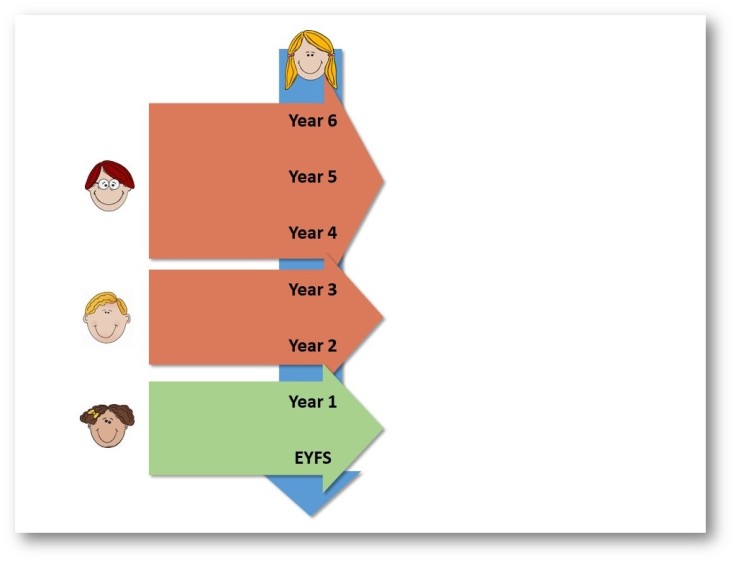 Recently, as part of our work with English subject leaders from across the county, the North Yorkshire English Advisory Team have been looking at how the subject is led differently in primary schools. English or literacy subject leaders tend to be talked about as a group, yet we know that what they actually do varies enormously.
Recently, as part of our work with English subject leaders from across the county, the North Yorkshire English Advisory Team have been looking at how the subject is led differently in primary schools. English or literacy subject leaders tend to be talked about as a group, yet we know that what they actually do varies enormously.
We have been particularly interested in the role that subject leaders have in the planning of teaching and of what is taught. This has arisen out of an increasing sense that raising standards in English and literacy requires focusing on curriculum and on effective long and medium term planning. It has also arisen out of the perceived, urgent need to address teacher workload, including through the efficiencies afforded by ‘collaborative’ and centralised planning. (This was a point emphasised by the Independent Teacher Workload Review Group in 2016.)
Complex relationships
To an extent, the exact role of the English subject leader depends on school size. Leading a core subject in a four-form entry school (rare in North Yorkshire) is clearly different from in a school with a total roll of just 60, or even just 20. (Our smallest school has one pupil.) The role is also complicated by the fact that schools usually have other people involved in ‘leading’ planning and teaching.
The English subject leader might, theoretically, have an overview of English planning and practice in all years.
However, in many schools the English lead has a minimal role in the EYFS phase, unless that is their own particular age-group. Instead, responsibility is shared with, or handed over to, the EYFS phase leader.
In most schools, class teachers take on considerable responsibility for planning themselves. In a smaller school with mixed-age classes, there may not be many class teachers for the subject leader to liaise with.
As the school gets larger, keeping in touch with what and how they are planning becomes harder for the subject leader…
…and harder…
And, of course, there may be year leaders, also with a role in planning. And there may be phase leaders, also with role in planning.
Meanwhile, the subject leader is charged with somehow ensuring coherence across all of this planning and teaching. They may talk with staff about consistency, progression, expectations, variety and values, but how effectively do they influence these things unless they have a handle on the planning of teaching?
Plotting influence
We have found it interesting to talk with subject leaders about where they see themselves on the following two axes, and about the potential advantages and disadvantages that this brings.
Firstly, there is the degree to which the subject leader is directly involved in planning. How closely do they influence what is taught and when, and how content is delivered in the classroom? How involved are they in shaping long term plans, in guiding medium term plans and in contributing to day-to-day plans?
Very broadly, the more involved with planning the subject leader is, the more likely it seems that there can be consistency in approach, coherence in the curriculum, and clarity around progression. Meanwhile, the less involved they are, the more space there is for ideas and practice to evolve and for teachers to develop professional autonomy.
Secondly, there is the degree to which subject leaders have seniority or formal authority within the school hierarchy.
Again very broadly, the more seniority the subject leader has, the easier it is for them to monitor practice, to implement change and to insist on an organised response to developments in the curriculum, assessment or pedagogical thinking. Of course, the less seniority they carry, the more time and space they are likely to have to research these things, to become an expert voice, to focus on details and to busy themselves with development; however, they will also be more reliant on the cooperation of colleagues and the backing of senior leaders.
We have found it interesting to discuss with subject leaders where they see themselves on this resulting quadrant, the further corners of which suggest four broad categories of subject leader.
The ‘Overseer’ is the subject leader with a senior position in the school, but with little direct involvement in planning. Their role is to set the course of colleagues’ planning, and to insist on corrections to that course. They keep an authoritative eye on the curriculum and they quality assure it from above.
The ‘Monitor’ is the subject leader who is neither directly involved in planning, nor has the authority in school to implement directly. Their role is more to advise and report on developments and to map what is happening.
The ‘Trusted specialist’ is the subject leader who has relatively little formal authority, but who has the expertise and the time to exercise considerable influence over the detail of what is taught and how, across year groups.
The ‘Director’ is the subject leader who has both the formal authority to implement and a close involvement in the detail of planning. They are therefore in a position to take on considerable responsibility and ownership of the subject.
When we asked a number of primary English subject leaders (not selected on any scientific basis) where they saw themselves, there was a fairly even spread from low to high involvement in planning, while there was some general weighting towards having the authority to implement.
However, there is some predictable difference between schools of different sizes. In the largest schools, subject leaders have more seniority, while still evenly spread in terms of how involved they are with planning.
 However, as schools get smaller, subject leaders seem less likely to have that sort of authority, but are more likely to be involved in planning across the school.
However, as schools get smaller, subject leaders seem less likely to have that sort of authority, but are more likely to be involved in planning across the school.
Questions for strategy
It is easy to talk about primary English subject leaders as though they are one thing, when in reality what they do and how they do it varies greatly from school to school.
Subject leaders might find it useful to reflect on where they would place themselves on the quadrant and why. Is there a tension between what is expected of them and what they are positioned to achieve? Would more involvement in planning allow them to achieve more? (Or does less direct involvement in planning allow other colleagues the opportunity to evolve practice in valuable ways?)
School leaders might find it useful to consider where their subject leaders already are on the quadrant, where they want those leaders ideally to be, and what their rationale is for this. In particular, the following questions might be useful.
- Is the subject leader invested with sufficient authority, influence or trust to manage change and to guide planning?
- Meanwhile, do they have the time and professional space (as well as the opportunity) to develop the specialist knowledge and expertise necessary?
- Is there clarity around the subject leader’s relationships with phase leaders, year leaders and classroom teachers?
- To what extent should planning for English be centrally coordinated or made collaborative, in order to ensure coherence across classes and year groups, and in order to reduce unnecessary workload?
- How directly involved should the subject leader therefore be in planning, and how fine-grained should that involvement be?
Any comments or reflections from subject and school leaders would be very welcome!
















Leave a comment